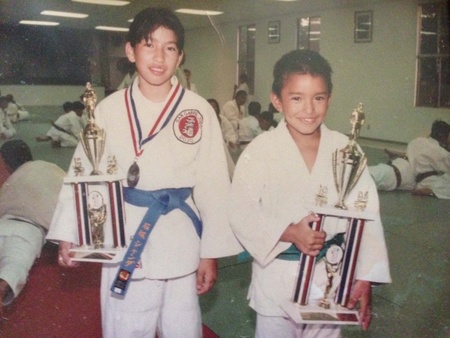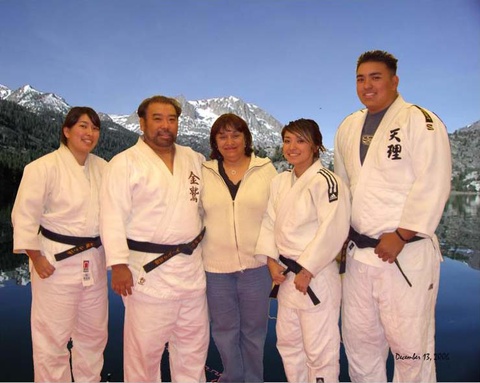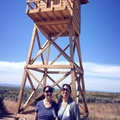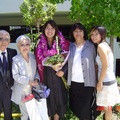Being a martial artist was not supposed to be a part of my life. The plan for me was to focus on school and get good grades. But my dad asked my younger brother to learn judo when he was five years old and I became jealous. I asked my father if I could join. He said that I could but with the condition that I had to stay in judo until I received a black belt. At this time, I should mention that my father was a judo sensei, and he was strict about not having any quitters in his family. I readily agreed to my father’s terms and joined judo when I was seven years old.
Being a girl in judo, I tried to test my boundaries and see where I belonged. At one practice my sensei brought out a kendo stick. He told us all to run and if we were slow, he would hit us with the stick. I smirked as he said this because I knew I wouldn’t get hit because I was a girl. One by one, I saw the boys get hit by the stick which made me smile and happy that I wasn’t a boy. I jogged in a carefree manner and suddenly I was whacked in the back by the stick. I was in shock. How could my sensei hit me?! I then realized if I wanted to be treated equally in judo with the other boys that also meant I was going to get punished the same way they did.
When I was 10 years old, I started to notice I was being judged by others for being mixed and a girl. I was getting picked on at school by another Hapa girl who was Chinese and Caucasian. She said I was too Japanese and Asian. She didn’t like that I hung out with the Asian girls, and she accused me of being ashamed for being Mexican. But I saw her as jealous because she was not accepted by the Asian girls. Our arguing eventually led to my first and only physical fight as we yanked each other’s hair across the schoolyard during P.E. class.
One day after practice, the boys circled around me, and my brother came in the circle to punch me in the stomach so no one else could see. The boys all laughed and then ran away as I yelled at them. I knew the boys pressured my brother to punch me because if any other boy punched me, I could get them in trouble. The boys at judo made fun of me for being “too American.” They said I could not be considered Japanese like them because of the way my parents raised me, that I didn’t speak Japanese, and because I was mixed. Because I was a girl, they said, I would never be as good as they were in judo. After that moment, I became very angry. I was tired of people making fun of me for being mixed, a girl, and in some cases “too American” and in other cases “too Japanese.” I was just trying to be myself.
How could I get the respect from the boys and for them to stop picking on me? My father always supported me, told me I was beautiful, and encouraged me to be a strong woman. But I knew in this situation I couldn’t go to my dad. I was afraid to show signs of weakness to my father. I also didn’t want to go to my mother. I figured she would suggest I tell them off and I was worried she would yell at them or talk to their mothers. I was embarrassed by my mother’s blunt way of speaking and direct communication style, so unlike the Japanese way. To me that approach didn’t work in the Japanese community. Instead, I decided on my own plan of revenge.
My revenge was to get first place at our dojo’s annual Christmas tournament. Usually the Christmas tournament is a friendly tournament where only the members of our dojo compete. But as I saw it, this in-house judo tournament was my only chance to compete with the boys. Traditionally, women and men don’t fight each other in judo tournaments. If I could beat the boys in this tournament, I would earn the respect I deserved, not only from the boys but also their parents. If the boys and their parents thought girls were weaker than boys, then I was going to show all them by humiliating the boys by beating them in front of all of the families and our instructors. I also wanted to humiliate their parents by watching their sons lose to a girl.
I was on a mission. I created a strict exercise plan to accomplish my goal as I knew I needed to practice twice as hard as the boys. I practiced at my dojo on Mondays and Fridays. On Tuesdays and Wednesday I would visit two other dojos. I played basketball every day at school, plus with my basketball team on the weekends. If I had free time, I lifted weights, ran, or rollerbladed around my neighborhood. Every day, my anger towards the boys at judo motivated me to continue training. Whenever I practiced throwing someone or trained for the tournament, I visualized beating each of the boys.
The Christmas tournament finally came. They changed the seating where they put chairs on the stage where the parents could overlook the judo mats. Just like I thought, they put me in with the boys my age. I threw one of the boys and heard the mothers in shock as they made noises and whispered to each other in the crowd. One of the senseis made fun of the boy for getting thrown by me, a girl. I secretly cracked a little smile to myself but then tried to make sure to come off as serious, humble, and collected. My plan was working, as I continued to win every match.
My last match of course had to be with Shozo for first and second place. Shozo was the ring leader of the group of boys, the one who was meanest to me, and also the best judo player. This was finally my chance to prove to everyone that I was the best. I gave myself a pep talk and then stepped on the mat. I tried my hardest but he threw me and followed with a pin to win the match. I ended up taking 2nd place. I could see the other boys’ faces of disappointment that I beat them and therefore I was happy.
Later on, the senseis gave out annual awards for the different people in the dojo, like “Most Inspirational” or “Most Improved.” I was so focused on beating the boys that I didn’t really care about getting an award. But then Sensei Mike started talking about the last award: the Kawai Sensei Award. The Kawai Sensei Award is the most coveted award for the dojo, given to the best player that embodies the spirit of judo and the dojo. Unlike the other awards that were given a trophy, this was a plaque that had the recipient’s name on it and stayed displayed at the dojo.
As Sensei Mike started to describe the person for this award I wondered if he was talking about me. My cheeks started to get warm, and I tried looking down at the floor. Then he said that it was a unanimous decision to give me the Kawai Sensei Award. He called my name and I ran up to him to bow, take the plaque, and shake hands with all the senseis. I was astonished. How did I, the shy, clumsy, Hapa girl get the most coveted award out of the entire dojo?
* * * * *
As I promised, I stayed in judo and I currently hold a fourth degree black belt. I competed and placed at several state, junior national, and junior Olympic tournaments.
As I reflect on that moment in my life when I was the “mad Hapa judo girl,” I felt I had to prove something. I wanted to show all the families at the dojo that I fit in and belonged there, that I wasn’t inferior because I was mixed race or a girl. Eventually, my identities of being mad, Hapa, and a girl faded away as I focused on being a judoka, a judo player. I could have stayed mad at the boys, the mothers, the senseis, in fact, stay mad at the entire world. But I hold an important lesson one of my senseis told me. He was bothered by judokas who would only credit themselves when they won a tournament, saying I did all of this on my own to deserve this medal. My sensei told us we don’t win by just our own merit but because of all the help we received from our senseis, our judo partners, and our families.
These boys at judo gave me the motivation to train and be a better judoka. They were the ones who helped me, even translated Japanese to English for me when there were senseis who only spoke Japanese. All of my mentors and senseis in judo have been men. I know they invested their time and energy in me, many of them passing onto me their secrets and skills. The judo families pitched in to take care of me, from feeding me at the tournaments to giving me rides to practice. I hold a true sense of gratitude for the boys, my senseis, and the families at judo who helped shape the woman I am today. Being in judo has taught me the true sense of the word “community,” and why I am inspired to continue to stay involved and give back to the Japanese community.
© 2013 Chanda Ishisaka








